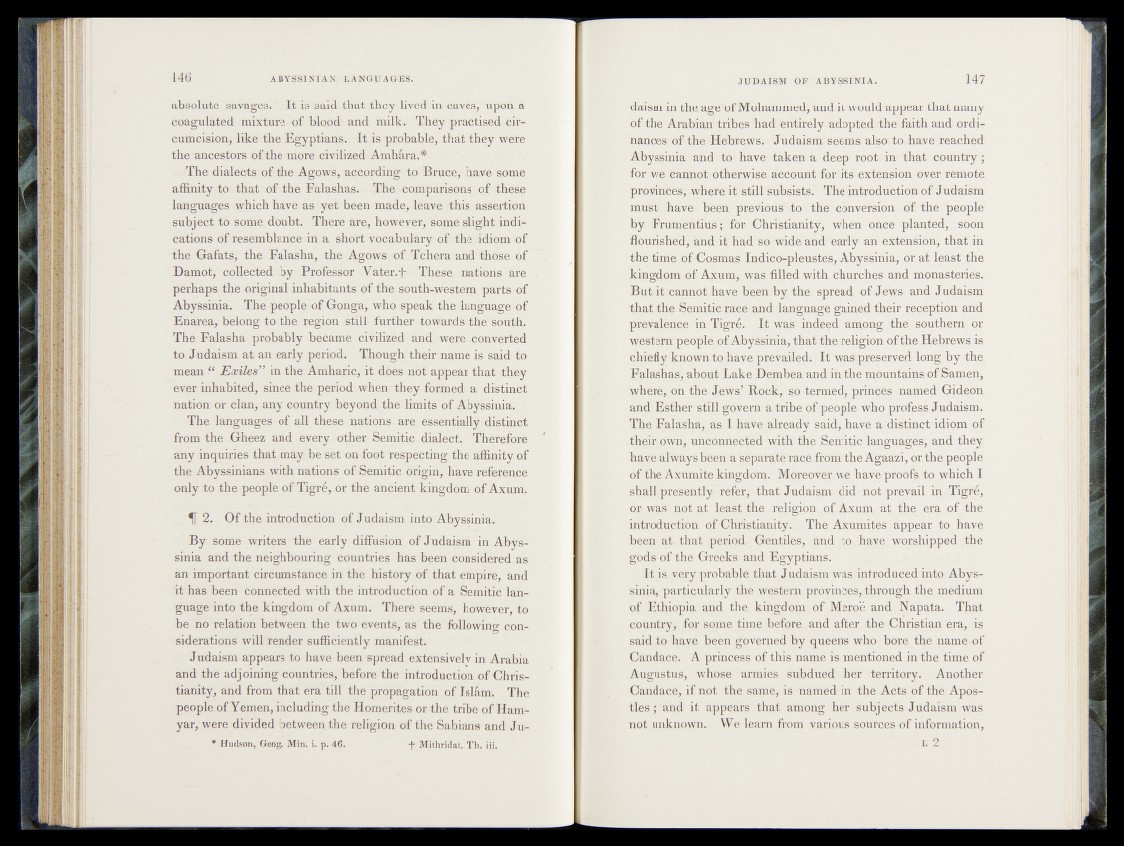
absolute savages. If i^-said that they lived in caves, upon a
coagulated mixture of blopd and milk. They practised circumcision,
like the Egyptians. It is probable, that they were
the ancestors of the xnôre eiviiÎAed Amhâra.*
The dialects of the Agows, according to Bruce, have some
affinity to that of the Falashas. The comparisons of these
languages which have as yet been made, leave this. assertion
subject to some doubt. There are, however, some slight indications
of resemblance in a short vocabulary of the idiom of
the Gafats, the Falasha, the Agows of Tchera and'those óf
Damot, collected by Professor Vater.-f* These nations are
perhaps the original inhabitants of the south-western parts of
Abyssinia. The people of Gonga, who speak the language of
Enarea, belong to the region still further towards the South.
The Falasha probably became civilized and were.;converted
to Judaism at an early period. Though their n^me is- said to
mean “ Exiles” in the Amharic, it does not appear that they
ever inhabited, since the period when~tfaey formed?- a distinct
nation or clan, any country'beyond the limits of Abyssinia.
The languages of all these nations are essentially distinct
from the Gheez and every other Semitic dialect.- Therefore
any inquiries that may be set on foot respecting the affinitjiof
the Abyssinians with nations of Semitic origin, have reference
only to the people of Tigré, or the ancient kingdom of Axum.
2. Of the introduction of Judaism into Abyssinia.
By some writers the early diffusion of Judaism in Abyssinia
and the neighbouring countries has been considered as
an important circumstance in the history of that empire, and
it has been connected with the introduction of a Semitic language
into the kingdom of Axum. There seems, however, to
be no relation between the two events, as the' following considerations
will render sufficiently manifest.
Judaism appears to have been spread extensively in Arabia
and the adjoining countries, before the introduction of Christianity,
and from that era till the propagation of Islâm. The
people of Yemen, including the Homerites or the tribe of Ham-
yar, were divided between,the religion of thé Sabiàns and Ju-
* Hudson, Geog. Min. i. p. 46. f Mithridat. Th. ill.
daism in th&age1 of Mohammed, and it Mould appear that many
of the Arabian^ tribes had entirely adopted the faith and ordinances
of tbd Hebrews. Judaism seems also to have’ reached
Abyssinia and to^have taken a deep - root.- in that country ;
for we cannot otherwise account for its extension over remote
provinces^ where it still subsists. The introduction of Judaism
must have* beem previous to the conversion -T@f the people
bÿ FrUmenthis ; for Christianity, when planted, soon
flourished, and it had M wide and early an extension, that in
the time of Cosmas Indico-pleustes, Abyssinia, dr at least the
kingdom of Axum, was filled with churches and monasteries..
gpjg j cannot have been; by the spread, of Jews and Judaism
that the Semitic race and language gained their reception and
prevalence in Tig$éj£ It was indeed an^ong the southern or
western people of Abyssinia, that the religion of the Hebrews is
chiefly known to have prevailed. It was preserved long by the.
Falashas, abput' Lake Dembea and in the mountains of Samen,
where, on the Jews’ Bock, s,o termed, princes- named Gideon
and Esther still govern a tribe of people who profess Judaism.
The Falasha, as I have already said, have a distinct idiom of
their own, unconnected with the Semitic languages, and they
have always been a separate race from the Agaazi, or the people
of the Axumite kingdom. Moreover we have proofs to which I
shall presently refer, that Judaism did not prevail in Tigré,
or was npt at least the-religion of Axum at the era of the
introduction of Christianity.. The Axumites appear to have
been at that period Gentiles, and to have worshipped the
gods of the Greeks and Egyptians.
It is very probable that Judaism was introduced into Abyssinia,
particularly the western provinces, through the medium
of Ethiopia and the kingdom of Meroë and Napata. That
country, for some time before and after the Christian era, is
said to have been governed by queens who bore the name -of
Candace. A princess of this name is mentioned in the time of
Augustus, whose armies subdued her territory. Another
Candace, if not the same, is named in the Acts of the Apostles
; and it appears that among her subjects Judaism was
not unknown. We learn from various sources of information,
l 2